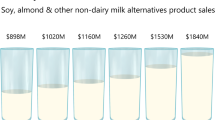Abstract
Lactic acid bacteria (LAB) are key for the fermentation of sourdoughs to improve the quality and nutritive value of bread. The aim of this study was to isolate the LAB starter for sourdough fermentation from Jeung-pyun, a Korean traditional rice cake. Among the twenty two LAB screened, five isolates were selected based on exo-polysaccharide production. Among them, three isolates showed cell growth greater than 8.5 Log CFU/g, maximum increase in the volume of dough, and dextran concentration up to 0.16%. During the sourdough fermentation, pH and total titratable acidity (TTA) were changed, as the three isolates synthesized lactic acid and acetic acid with fermentation quotients less than 2.0. They were identified as Leuconostoc lactis EFEL005, Lactobacillus brevis EFEL004, and Le. citreum EFEL006. They displayed good fermentation properties (growth, dextran production, pH, and TTA) in dough and they are regarded as potential starters to be used in sourdough fermentation.


Similar content being viewed by others
References
Clarke CI, Arendt EK. A review of the application of sourdough technology to wheat breads. Adv. Food Nutr. Res. 49: 137–161 (2005).
Tingirikari JMR, Goyal A. A novel high dextran yielding Weissella cibaria JAG8 for cereal food application. Int. J. Food Sci. Nutr. 64: 346–354 (2013).
Tingirikari JMR, Kothari D, Goyal A. Superior prebiotic and physico-chemical properties of novel dextran from Weissella cibaria JAG8 for potential food applications. Food Funct. 5: 2324–2330 (2014a).
Katina K, Maina NH, Juvonen R, Flander L, Johansson L, Virkki L, Tenkanen M, Laitila A. In situ production and analysis of Weissella confusa dextran in wheat sourdough. Food Microbiol. 26: 734–743 (2009).
Arendt EK, Ryan LAM, Dalbello F. Impact of sourdough on the texture of bread. Food Microbiol. 24: 165–174 (2007).
Di Cagno R, De Angelis M, Limitone A, Minervini F, Carnevali P, Corsetti A, Gaenzle M, Ciati R, Gobbetti M. Glucan and fructan production by sourdough Weissella cibaria and Lactobacillus plantarum. J. Agric. Food Chem. 54: 9873–9881 (2006).
Gerez CL, Torino MI, Roll G, Devaldez FG. Prevention of bread mould spoilage by using lactic acid bacteria with antifungal properties. Food Control. 20: 144–148 (2009).
Loponen J, Kanerva PI, Zhang C, Sontag-Strohm T, Salovaara H, Ganzle M G. Prolamin hydrolysis and pentosan solubilization in germinated-rye sourdoughs determined by chromatographic and immunological methods. J. Agric. Food Chem. 57: 746–753 (2009).
Choi H, Kim YW, Hwang I, Kim J, Yoon S. Evaluation of Leuconostoc citreum HO12 and Weissella koreensis HO20 isolated from kimchi as a starter culture for whole wheat sourdough. Food Chem. 134: 2208–2216 (2012).
Katina K, Arendt E, Liukkonen KH, Autio K, Flander L, Poutanen K. Potential of sourdough for healthier cereal products. Trends Food Sci. Technol. 16: 104–112 (2005).
Park YU, Kim MD, Jung DH, Seo DH, Jung JH, Park JW, Hong SY, Cho JY, Park SY, Shin WC, Park CS. Probiotic properties of lactic acid bacteria isolated from Korean rice wine makgeolli. Food Sci. Biotechnol. 24: 1761–1766 (2015).
Korakli M, Rossmann A, Gänzle MG, Vogel RF. Sucrose metabolism and exo-polysaccharide production in wheat and rye sourdoughs by Lactobacillus sanfranciscensis. J. Agric. Food Chem. 49: 5194–5200 (2001).
Kang CS, Kim HS, Cheong YK, Kim JG, Park KH, Park CS. Flour characteristics and end-use quality of commercial flour produced from Korean wheat and imported wheat. Korean J. Food Preserv. 15: 687–693 (2008).
Rantsiou K, Urso R, Iacumin L, Cantoni C, Cattaneo P, Comi G, Cocolin L. Culture-dependent and independent methods to investigate the microbial ecology of Italian fermented sausages. Appl. Environ. Microbiol. 71: 1977–1986 (2005).
Yazar G, Tavman S. Functional and technological aspects of sourdough fermentation with Lactobacillus sanfranciscensis. Food Eng. Rev. 4: 171–190 (2012).
Corsetti A, Settanni L, Valmorri S, Mastrangelo M, Suzzi G. Identification of subdominant sourdough lactic acid bacteria and their evolution during laboratory scale fermentations. Food Microbiol. 24: 592–600 (2007).
Lacaze G, Wick M, Cappelle S. Emerging fermentation technologies: development of novel sourdoughs. Food Microbiol. 24: 155–160 (2007).
Arendt EK, Moroni A, Zannini E. Medical nutrition therapy: use of sourdough lactic acid bacteria as a cell factory for delivering functional biomolecules and food ingredients in gluten free bread. Microb. Cell Fact. 10: S1–S15 (2011).
Tingirikari JMR, Kothari D, Shukla R, Goyal A. Structural and biocompatibility properties of dextran from Weissella cibaria JAG8 as food additive. Int. J. Food. Sci. Nutr. 65: 686–691 (2014b).
Jayaram V, Cuyvers S, Lagrain B, Verstrepen K, Delcour J, Courtin C. Mapping of Saccharomyces cerevisiae metabolites in fermenting wheat straight-dough reveals succinic acid as pH-determining factor. Food Chem. 136: 301–308 (2013).
De Vuyst L, Vancanneyt M. Biodiversity and identification of sourdough lactic acid bacteria. Food Microbiol. 24: 120–127 (2007).
Reed G, Nagodawithana TW. Baker’s yeast production. Vol. I, pp. 261–314. In: Yeast Technology. Reed G and Nagodawithana TW (eds). Van Nostrand Reinhold Publishing Inc., New York, USA (1991).
Rocken W, Rick M, Reinkemeier M. Controlled production of acetic acid in wheat sour doughs. Z. Lebensm. Unters. For. 195: 259–263 (1992).
Hammes WP, Ganzle MG. Sourdough breads and related products. Vol. I, pp. 199–216. In: Microbial Fermented Foods. Woods BJB (ed). BAP- Publishing Inc., London, UK (1998).
Lim SB, Tingirikari JMR, Kwon YW, Li L, Han NS. Polyphasic microbial analysis of traditional Korean Jeung-pyun sourdough fermented with makgeolli. J. Microbiol. Biotechnol. https://doi.org/10.4014/jmb.1607.07033.
Acknowledgements
The present work was supported by the funds from SPC group and the National Research Foundation (NRF-2017M3C1B5019292) of the Ministry of Science, ICT and Future Planning, Republic of Korea.
Author information
Authors and Affiliations
Corresponding author
Ethics declarations
Conflict of interest
The author, Sangmin Shim, belongs to SPC group.
Rights and permissions
About this article
Cite this article
Lim, S.B., Tingirikari, J.M.R., Seo, J.S. et al. Isolation of lactic acid bacteria starters from Jeung-pyun for sourdough fermentation. Food Sci Biotechnol 27, 73–78 (2018). https://doi.org/10.1007/s10068-017-0274-0
Received:
Revised:
Accepted:
Published:
Issue Date:
DOI: https://doi.org/10.1007/s10068-017-0274-0




